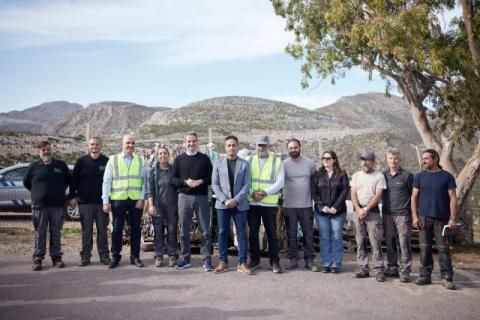
Zero-waste project in Greece shows promise, says UMN, INSEAD researchers
Wednesday, April 24, 2024
Greece’s prime minister learns of project during visit earlier this month
The Greek island of Tilos is home to one of the world’s most successful zero-waste projects. Led by Polygreen, a circular economy solutions company, the 700+ residents of the small island completely eliminated its landfilling and brought its recycling rate to a record high of 89.2 percent during a two-year period.
Researchers have been studying the project to identify ways to scale up the Tilos model for major cities around the world. That includes a team from INSEAD Business School’s Sustainable Business Initiative (SBI)—Professors Atalay Atasu, Luk Van Wassenhove, and Amitava Chattopadhyay—and Necati Ertekin, assistant professor of supply chain and operations at the University of Minnesota’s Carlson School of Management.
In early April 2024, Ertekin presented the group’s ongoing research efforts to Greece’s Prime Minister Kyriakos Mitsotakis and other government officials when Mitsotakis visited the island. During his remarks, Ertekin stressed what he calls the “secret sauce” of Tilos: resident engagement.
“What we see is that consistent, ongoing education and engagement really pays off,” explains Ertekin. “This is done through individualized service, heavy-human involved training efforts with residents, increasing awareness for the benefits of the program through one-to-one interactions, systematically measuring individual household recycling performance, and respectful, consistent, and transparent service delivery.”
Following the prime minister’s visit, he authorized the expansion of the zero waste management model from Tilos to an additional 15 Greek islands, initiating the second large-scale expansion of the Tilos model after Abu Dhabi.
Determining how to scale the success in Tilos is critical for the world. According to the United Nations, waste totals 11.2 billion tons annually and contributes five percent of the world’s greenhouse gasses.
“SBI’s research on the key ingredients for achieving scalability is important to the success of this ambition”, emphasizes Van Wassenhove. “Replicating a business model often entails the risk that newly established teams in other locations may not fully grasp the fundamental aspects of the business concept. Our goal is to pinpoint these aspects and devise effective methods to transfer them successfully to the teams operating in other islands and in the Middle East.”
One way to scale is through the use of virtual reality (VR) technology, which would replace the large human effort of training residents. The research team is in the process of collecting data from a pilot study, which will inform the use of the first VR aided residential training program in Abu Dhabi. The technology aims to provide more continuous education, increase awareness, and ensure collection of actionable household-level data.
Learn more about the Just Go Zero Tilos initiative by listening to this podcast featuring a conversation between Atalay Atasu, Professor of Technology and Management and academic director of the INSEAD SBI and Imran Gill, CEO for the Middle East at Polygreen.
